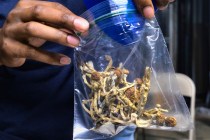Officials: County pot goal isn’t to be enriched

Clark County officials say they don’t want the county to be enriched from the fledgling medical marijuana industry’s business license fees.
The goal is for fees to cover the costs. But the medical marijuana industry in Southern Nevada is in its infancy, and the revenues of businesses, upon which fees are based, are difficult to predict.
County commissioners on Tuesday had an initial discussion about fees for medical marijuana businesses. They plan to make a decision in October, after hearing comments from business owners.
Under the proposal, dispensaries, cultivation facilities and production businesses would be subject to a tiered structure based on revenues. A business would be required to pay 1 percent of gross revenues if it has $150,000 or less of revenue in a quarter; 2 percent for revenue between $150,000 and $400 each quarter; and 3 percent for revenue exceeding $400,000 a quarter.
Laboratories would pay a flat rate of 0.00005555 percent on gross revenues.
Under preliminary estimates, the county fees generated from 18 dispensaries and 18 cultivation establishments would amount to $216,000 a year. That’s assuming the businesses fall within the lower bracket, each one with $600,000 of revenue a year, or $150,000 a quarter.
County Business License Director Jacqueline Holloway said the industry revenue projections are made with a conservative approach, and the proposed fees aren’t viewed as a revenue tool.
Commissioners agreed.
“I don’t want to gouge the businesses,” said Commissioner Chris Giunchigliani, adding that recouping costs is the goal.
Commission Chairman Steve Sisolak said the revenue estimates appear to be low, compared to the millions of dollars investors are putting into the businesses.
“I can see this being an enormous amount of money coming in, and that wasn’t my intent,” he said.
The county’s costs for the first year are estimated at $349,173. The bulk of that is $307,173 for the salaries and benefits of three employees — a special agent, a management analyst and an investigative auditor. Another $42,000 is for supplies and equipment expenses.
After setting the fees, county officials want to review the issue a year later and see how the dollars and costs tally out.
County Manager Don Burnette said there’s a good deal of uncertainty, and it’s difficult to predict how the market will respond.
The county has already received almost $1 million in fees from applications for special permits from nearly 200 applicants.
The county in June approved 18 applicants for dispensaries, 58 permits for cultivation facilities, 38 permits for production facilities and five permits for laboratories for testing the medical marijuana.
Contact Ben Botkin at bbotkin@reviewjournal.com or 702-405-9781. Find him on Twitter: @BenBotkin1.


















